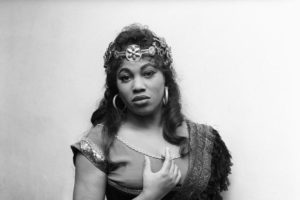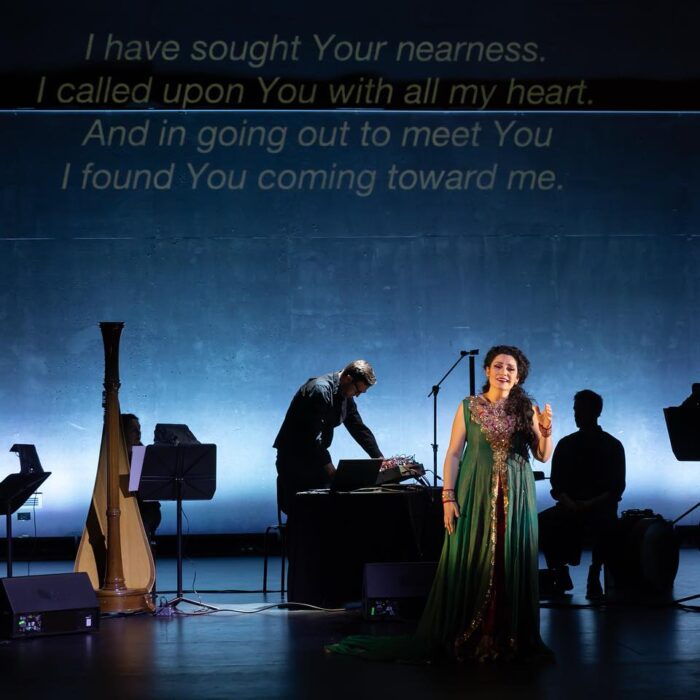
Leontyne Price, Divine & Down-To-Earth: One of OperaWire’s Writers Remembers the Diva From a Unique Perspective
By Lois SilversteinAIDA.
The Metropolitan Opera production of 1985 starring Leontyne Price in her glory days, in its online stream, seemed like yesterday. In a flash it seemed like yesterday too when I trailed the great diva down a full-flight of stairs on the San Francisco Opera stage in her role debut as Manon in Puccini’s opera.
In a long, maroon cloak, a high, French-twist red wig on my head, my faced painted white in the style of 18th century French Ladies of the Night, I played one of her non-singing but comradely courtesans about to be transported to Louisiana. Elisa. That was me.
Price donned a sumptuous high, curled silver-blonde wig and a glorious dress of 18th century décor. She looked stunning save for the choice by the make-up department to stripe her nose with pale white to highlight — what exactly? She rounded up her “sister travelers” back stage, and laughed: a black woman in “white face”? Blonde wig? Qui le sait?
When I became a Super, I didn’t know all it would entail, but I went ahead with it anyway. To get as close to the sound I came alive with when I could barely sing was rapture.
“Manon Lescaut” was my first part. Make-up, costume, nightly rehearsals galore for months, the key thing for me was not to trip, fall, and push the divine singer down the stairs and make a mess of her opening night. Not to say a mess of my chance to trod the boards for all of $2.00 a night.
Behind Price I was to travel as she again moved forward into something new and splendid.
She who traveled from Mississippi to the Met, during the height of segregation in America.
She who made her way from the stage, television and touring opera company to the Olympian realm of opera deities. She of the radiant voice and formidable stage presence – Cleopatra, Violetta, Manon, Aida, not only with sonorous sound, but stately presence, and robust conviction.
Leontyne Price crossed barriers; she mixed modes. More democratic than elite (which opera is accused of being, so often) she reached out of the ordinary person. But as she reached for the heavens, she was also down-to-earth, funny, enchanting, friendly.
I loved it. My moments behind and beside her, I learned that respect didn’t require I stand apart and gawp at her, or hover in the wings while she wrestled the beauty out Puccini’s youthful masterpiece. I could stand near as she laughed and told family stories with the same delight my teenage friends and I did once upon a time. She broke barriers here too. Who would not take it to heart?
To see some of this ability in replay here in California seemed doubly powerful. Once more we were in the present of greatness, then and now. For, Leontyne Price not only broke barriers of technical and aesthetic control and beauty, she reminded us how grand opera is – how it transcends the daily, the quotidian, and then lifts us into the extraordinary.
She took the opportunities limited to African-Americans in the opera world as well as elsewhere. And she triumphed. Her voice? As if a brazier had lit it up inside her throat, as if an angel had sped down its tunnel and gilded it with fire. And, as if fire could speak, fire could spell, fire could warm and keep fed and full the universe in all its flames, and not burn, not destroy, but breed.
A paradox, of course, and yet, that’s what her voice conjures up. For, the very fragility of the voice is its power, its transience its magic. Leontyne Price. Radiance? Courage? When I first heard “O Patria Mia” and the “Triumphal March” from “Aida,” I heard it as a child, in the form of camp songs. Then, I had no idea about Verdi, or the story of a slave girl and her transformation. But, I was moved beyond my years, beyond tears, and only when I could put names to feelings did I realize that this was not just music but glory and a way to turn life into rapture.
“Aida” at the Met, 1985, was a high-water mark for Leontyne Price and the opera house. In the replay in May 2020, there she stood again in majestic silence when the audience offered her five minutes uninterrupted applause. Here was a small but deliberate tribute to art, beauty and gratitude. But in addition, it was a portrait of a real woman and a real artist, singing a real set of notes put down on a page by a real person, Giuseppe Verdi, once upon a time, and yesterday. Price was real, Verdi was real, Manon was real, and so was her famous Aida, standing still and proud, humble and accepting.
When we hear opera, we expect to enter the transcendent realm. That’s what we go for, although we find so many treasures along the way we cannot enumerate them all.
But when we come across gold, we stop dead in our tracks. It is life itself and like an act of prayer, the sound that cracks open mind and heart and lets us breathe in the fullness of the universe, despite darkness, despite despair. Now, in a dark time, the opera we listen to and love all over again online reminds us that as we expire, we also live, and this glorious music inspires us every day to do so.
Categories
Special Features

